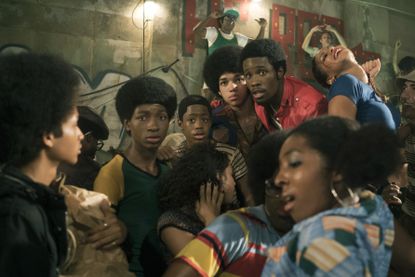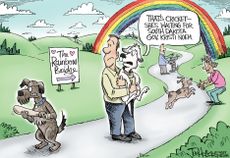The Get Down is quintessential Baz Luhrmann, and it's brilliant
The familiar hallmarks of Luhrmann's cinematic brand are all there: dance, music, and a poet-hero in love


The Get Down — the long-anticipated Bronx musical about the mythical rise of hip-hop and the death of disco in the '70s — drops on Netlix August 12. And be warned: If the first three episodes are any indication, it's an ambitious, grainy, gorgeous, absurdly poetic hurricane of feelings. Here's a taste:
Created by Baz Luhrmann with executive producers Catherine Martin (a longtime Luhrmann collaborator), Nas, and playwright Stephen Adly Guirgis, The Get Down cast a wide net in its efforts to historicize its mythmaking and world building with input from the likes of Grandmaster Flash and the brilliant Nelson George. This was essential (it isn't exactly an intuitive move, mixing an art form predicated on street cred with Luhrmann's lushly sentimental brand). The results are sweaty and exuberant and ostentatiously imperfect: The camera whips back and forth between warm and depressing interiors and the jagged joys of New York's crumbling streets. It crouches down to watch shiny boots and disco bellbottoms walking from a low and flattering angle. It flirts, but it doesn't polish.
Things are certainly stylized, however. The girls, for instance, look good in frankly impossible shorts. And if the boys are reedy and fuzzy and clearly undeveloped, the men are heavily manicured — they gleam. Whether it's Cadillac's gold or Shaolin Fantastic's Pumas or even just Mr. Kipling's snazzy blazer collection, the sartorial choices here speak volumes about the new cosmetics of masculinity. Style means business: The outfits people wear in Fat Annie's disco fight with those worn at Grandmaster Flash's Get Down. Still, the show's circuses aren't buffed and glossed the way Luhrmann's are. In The Get Down, spectacles — no matter how slick — perspire.
Subscribe to The Week
Escape your echo chamber. Get the facts behind the news, plus analysis from multiple perspectives.

Sign up for The Week's Free Newsletters
From our morning news briefing to a weekly Good News Newsletter, get the best of The Week delivered directly to your inbox.
From our morning news briefing to a weekly Good News Newsletter, get the best of The Week delivered directly to your inbox.
If Luhrmann's sometimes overwhelming aesthetic gets toned down, his thematic overreach doesn't. The Get Down is basically a distillate of the Red Curtain trilogy, combining the dancing of Strictly Ballroom with the singing from Moulin Rouge and the poetry of Romeo + Juliet. Plus art — the art of tagging, the art of scratching.
And there's love. Wow, is there love. Luhrmann remains the champion of romantic masculinity — of male bodies so contorted with grace and desire that they lose all reserve. They will not be sober or still or silent. They move. And whether the love they're feeling is fraternal or romantic — and irrespective of whether it develops into hatred or despair — it gets lyricized, analyzed, discussed. One has only to think of Harold Perrineau's spellbinding Mercutio in Romeo + Juliet to think of the odd brilliance relations like friendship or enmity acquire in Luhrmann's hands.
Our hero, Zeke (played in his younger incarnation by Justice Smith), is a poet. A "wordsmith." And he makes it big. We learn this because we encounter him as an adult first (played by Daveed Diggs) — and the magnitude of his success is clear before we know who he is or why we care. We know Zeke made it because the series opens with a rap star narrating his past in the first person. It's noteworthy, I think, that this man is shockingly hard to connect to Young Zeke as we'll come to know him. Diggs sounds nothing like Zeke. He looks nothing like Zeke. He's assured and confident and sharp where Zeke is hesitant and moony and soft.
He is, nevertheless, our hero. We know this because this is a Luhrmann enterprise, and there are rules. As in Moulin Rouge, which begins with Ewan McGregor typing his sad story on a typewriter, a Luhrmann project must begin by announcing its literariness and its distance from the time in which it's set. Ideally, it does this via a poet-hero in love.
Sign up for Today's Best Articles in your inbox
A free daily email with the biggest news stories of the day – and the best features from TheWeek.com
Zeke is such a poet-hero. Here's how his adult incarnation introduces us to the world we're going to explore: "I came from the city, back in the time / 1977, it was maximum crime / The Bronx, we had to rumble with rivals on the rubble while buildings around us would crumble / But yo my life began last year, sophomore of high school / That summer I saw her, said to myself, 'She'll be my wife soon.'"
There it is: love! And then we zoom in. The camera cuts to Zeke as a boy in 1977, when he's thinking about that girl. He's scribbling into a notebook, his face soft with feeling (Moore plays this so well). "I blush when you see me," he recites, "I cry when you sing, cuz when you sing it's like — it's like how red velvet feel. That's how you sing."
It's beautiful, and it's startlingly different from the lyrics introducing the love that inspired it. Thus is the distance between Young Zeke and Adult Zeke introduced. The trajectory that produced it? That turned a sappy romantic who bares his soul into a rap star who hides his eyes? Those are the dots The Get Down is going to connect.
The extent to which Adult Zeke's hardening is only skin-deep is fairly clear from the first episode, which ends with him onstage once more. "I will not forget the love you gave," the backup singers croon. Daveed — the adult Zeke — turns away from the audience and pulls off his shades. The camera nosily zooms in on him, lights up his face, gives us a good look. Daveed's a good actor and his face assumes a softness impossible to imagine in Zeke the Star. Only at this worryingly funereal musical moment does the link between the boy we're watching and the man he's become seem plausible.
That moment was good for Zeke — and good for tracking the show's aspirations — but I'm worried about what that funereal moment portends for Mylene. Played by Herizen Guardiola with an expert mix of ambition and melancholy, she's a terrific character — the perfect foil to Zeke's desire and faith and misplaced drive — but anyone who knows Luhrmann's work knows the poet-heroes tend to watch their muses die. Here's hoping The Get Down breaks with tradition.
Editor's note: This article originally misidentified the actor who plays Zeke. It has since been corrected. We regret the error.
Create an account with the same email registered to your subscription to unlock access.
Lili Loofbourow is the culture critic at TheWeek.com. She's also a special correspondent for the Los Angeles Review of Books and an editor for Beyond Criticism, a Bloomsbury Academic series dedicated to formally experimental criticism. Her writing has appeared in a variety of venues including The Guardian, Salon, The New York Times Magazine, The New Republic, and Slate.
-
 5 high-caliber cartoons about Kristi Noem shooting her puppy
5 high-caliber cartoons about Kristi Noem shooting her puppyCartoons Artists take on the rainbow bridge, a farm upstate, and more
By The Week US Published
-
 The Week Unwrapped: Why is the world running low on blood?
The Week Unwrapped: Why is the world running low on blood?Podcast Scientists believe universal donor blood is within reach – plus, the row over an immersive D-Day simulation, and an Ozempic faux pas
By The Week Staff Published
-
 Rishi Sunak's asylum spat with Ireland explained
Rishi Sunak's asylum spat with Ireland explainedIn Depth Irish government plans to override court ruling that the UK is unsafe for asylum seekers
By The Week UK Published